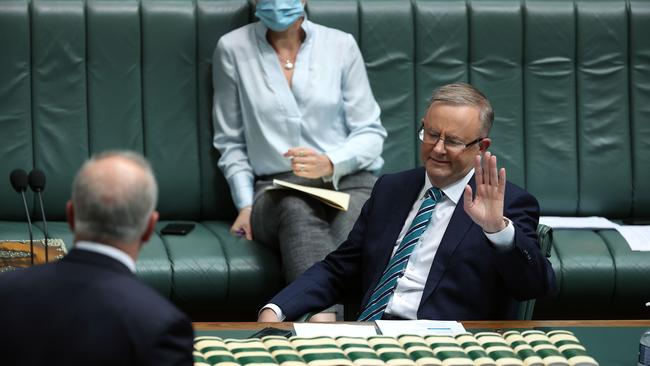Covid reveals how our political class is failing us
The next election is likely to highlight just how bereft of ideas both our major parties really are.

We are a lucky country. Our resources and geographical positioning give us untold comparative advantages over other nations – as long as our geographic isolation from other Western democracies doesn’t become a security threat that overwhelms us.
We’ve seen the value of our global positioning as a trading nation, and recently in the context of avoiding the worst of the coronavirus. And because we are already a developed nation, our technology, health and educational settings are such that we will continue to sit at the top of the global tree for some time to come.
But maintaining that dominance, and indeed improving on it, requires the political class to step up. To take advantage of the post-pandemic new world order and the ways in which society needs to adapt to a global construct likely to be weighed down by the ongoing impact of Covid-19, including how it will force change.
We are living through a pandemic and will be for some time to come. Make no mistake, history has taught us that pandemics don’t come and go quickly.
In a sense, the pandemic of 1918-20 – as severe and deadly as it was – taught us the wrong lessons as we entered this one. It was the exception that proved the rule. It left us thinking that the worst-case scenario was significant deaths and serious illnesses over just a few years rather than a decade or more.
Because World War I preceded that early 20th-century pandemic, and it was soon followed by the Great Depression and World War II, the Spanish Flu wasn’t the defining moment in history it could have been. Therefore, it didn’t require policymakers to step up in its aftermath the way they need to now. The focus was elsewhere.
However, when we look further back at pandemics of the past, they have lasted longer and been defining moments, impacting societies in far greater ways. This is what policymakers need to be ready for in the coming years.
A hundred years from now, when historians look back on Covid-19, they won’t see it as “the 2020 pandemic”. We know that even now, as the after-effects have already overtaken 2021. The Covid-19 pandemic will likely be seen as the pandemic of the 2020s. Think about that and then turn your attention to the political class charged with successfully seeing us through it.
How much faith do you have in its ability to make good decisions? To make tough decisions for the betterment of society, even if there are political consequences? And what about the media and the commentariat. Do you think they are up to the task of sifting through what’s important and what’s not? Evaluating serious policies and decision-making in more than a glib way? Do they have the attention span to do so, the necessary skills sets? What about voters?
Equally, is our adversarial system of government properly equipped to handle all of the above? What about the federation? Can you seriously see state and federal co-operation overcoming political differences and narrow parochialism to set us up for a more stable future?
There should be little doubt that the pillars of stability that once ensured Western democracies like ours could withstand shocks are crumbling. What’s left is a decaying epicentre of a system that both underestimates the longer-term seriousness of this pandemic and couldn’t adequately plan for it even if a greater consciousness did exist.
Meanwhile, the public seems unaware of how long the after-effects of this pandemic might last, if not the pandemic itself. Mutations in the virus, new strains, will pose challenges to new and innovative vaccines. The underdeveloped world’s inability to adequately gain access to vaccines will fracture whole regions. Even successfully combating coronavirus risks lengthening the time it takes to defeat it: reducing the health consequences for many of us but elongating the time it takes to fade away. This is where modern society helps us survive a pandemic but doesn’t necessarily reduce the length of time we have to live through it.
The Black Death plague in the mid-14th century wiped out one-third of the global population, and that was at a time when the interconnectedness of the world was nothing like it is today. It also lasted a decade, with after-effects that profoundly reshaped governance.
Back in Roman times the Antonine plague of 165AD – believed to be smallpox – lasted a full 15 years, after returning soldiers brought the disease home from afar. It killed more than five million and acted as the precursor to the fall of Rome. One hundred years later, another plague (the Cyprian plague) also hit a debilitated Roman empire, lasting two decades.
More recently, when the new world of the Americas was discovered by Europeans, plagues ripped through the Indigenous populations during much of the 16th century, killing around 90 per cent of the population.
In raw numbers these historical plagues didn’t kill as many people as the Spanish Flu. But they lasted longer, affected a larger cohort of the impacted populations and profoundly reshaped the communities touched by them.
The Covid-19 pandemic won’t kill anywhere near as many people as Spanish Flu either, but it has already killed millions, and millions more will die from new variants, and certainly in the underdeveloped world.
Yet this isn’t the lens through which to assess the impact of Covid-19. What it does to our way of life, the world order of powerful nations, how cultures from one country to the next interact with each other, and the way of thinking younger people growing up impacted by Covid-19 subsequently approach the rest of their lives.
What restrictions from government we tolerate, how innovative policymakers become in addressing the demands citizens have of government, how the human race chooses to prioritise rights verses responsibilities, and what reach of government into our daily lives we come to accept. These social consequences are the real impact of Covid-19.
The political class now and into the future will be charged with managing all of the above. How confident are we that it is up to the challenge?
Peter van Onselen is a professor of politics and public policy at the University of Western Australia and Griffith University.






The next election is likely to highlight just how bereft of ideas both our major parties really are. Timid, unwilling or unable to set Australia up for a prosperous post-pandemic future. Both Labor and the Coalition lack the lateral thinking and political courage to ascribe the policy settings we need to lock in the stability future generations deserve in the wake of this pandemic.